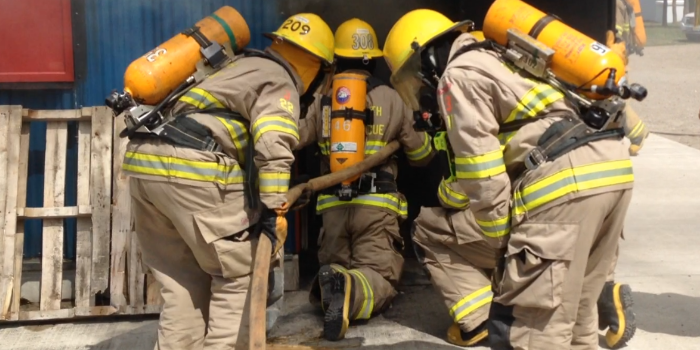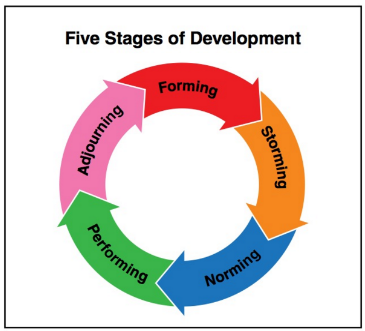Team Effectiveness Assessment
Building and supporting a top notch team!

As a Firefighter, the only thing you don't do as a team is get dressed.
Teamwork has a dramatic affect on organizational and fireground performance.
An effective team can help fire departments achieve incredible results.
A team that is not working can cause unnecessary disruption, mission failure and on the worst day, loss of property and life.
In a fire department, it is impossible to avoid being a member of team. If you're not on an official team on an emergency scene, chances are you function within one in one way or another every tour. So it's important for your personal and career development to know your teamworking strengths and weaknesses.
This assessment helps you uncover common teamworking problems that you might be experiencing. Once you've completed the assessment, we direct you towards team tools that will help you to improve and develop these important skills.
How good are you and your team at teamwork and team building?
Instructions
Note: This assessment tool is private and your score is not recorded or accessible by your instructor. It is for private personal reflection and to help you find areas where you are strong, and others where you can improve.
For each statement, click the button in the column that best describes you. Please answer them as you actually are, rather than how you think you should be, as this will give you the most accurate feedback. You can redo this assessment as many times as you want over time to reassess your progress. When you are finished, click the "Score my Assessment" button at the bottom.
Rate these Statements Yourself |
Never | Rarely | Sometimes | Often | Always | |
|---|---|---|---|---|---|---|
| 1 My team is knowledgeable about the stages of development teams can be expected to go through. | ||||||
| 2 Team members are provided with a great deal of feedback regarding their performance. | ||||||
| 3 Team members are encouraged to work for the common good of the organization. | ||||||
| 4 There are many complaints, and morale is low on my team. | ||||||
| 5 Team members don't understand the decisions that are made, or don't agree with them. | ||||||
| 6 People are encouraged to be good team members, and build good relationships. | ||||||
| 7 Team members are provided with development opportunities. | ||||||
| 8 Meetings are inefficient and there is a lot of role overlap. | ||||||
| 9 Team members are encouraged to commit to the team vision, and leaders help them understand how their role fits into the big picture. | ||||||
| 10 Team members are often given a chance to work on interesting tasks and stretch their knowledge and capabilities. | ||||||
| 11 The team understands what it needs to accomplish and has the resources needed to be successful. | ||||||
| 12 Conflict and hostility between members is a pervasive issue that doesn't seem to get better. | ||||||
| 13 People feel that good work is not rewarded and they are not sure what is expected of them. | ||||||
| 14 Team members balance their individual needs for autonomy with the benefits of mutual interdependence. | ||||||
| 15 Working relationships across units or functions is poor, and there is a lack of coordination. | ||||||
Score Interpretation
| Score Range | Advice about your Score |
|---|---|
| 15-30 | Your understanding of team membership and leadership is still forming. The good news is that you've got a great opportunity to improve your effectiveness within a team and its effectiveness. (Read below to start.) |
| 31-45 | Your effectiveness as a team player and leader, and your team's effectiveness are patchy. You're good at some things, but there's room for improvement elsewhere. Focus on the serious issues below, and you'll most likely find that you and your team are soon achieving more. (Read below to start.) |
| 46-75 | You're a solid team member and leader, working well within an effective team. Lower scores in this range show that there is room for improvement, though. Read the following summaries of key teamwork functions and determine which of the tools will help you become a better team player and build a stronger team. (Read below to start.) |
Team Development
(Questions 1, 11)
Your score is 0 out of 0Teams do not become effective overnight. Team building is a process that requires due attention and care. If you try to skip over important development stages, you risk not forming the solid foundation needed when trouble or setbacks occur.
To build, lead, or participate in a team requires an understanding of the stages of team development. Through extensive research, it has been found that successful teams have certain aspects of their development paths in common. The one that most people are aware of is Bruce Tuckman's Forming, Storming, Norming, Performing and Adjourning model.

- Forming — As relationships within the group grow, trust and respect develop and the members begin to see themselves as a part of the group. They become enthusiastic about the challenges of a new project or task.
- Storming — Conflicts may result as members jockey for informal leadership or try to exert their own influence over the group. Company officers can reduce the time spent in the storming phase by actively listening to members and explaining decisions.
- Norming — The group establishes its own sets of norms and values that each member accepts and adheres to during this stage.
- Performing — Thesupervisor maintains teamspirit as the group accomplishes its objectives.
- Adjourning — The final stage is the termination of the group task. It includes acknowledging the group’s accomplishments and the participation of the individual members. It is also an opportunity to debrief and determine if any process changes should be made.
Two other factors that significantly increase a team's chances of being effective are having a well thought out team orientation process, and developing a clear team charter. Both of these help you establish clear guidelines and set clear expectations. When the individuals on a team all know what they are supposed to be doing and how they are to go about doing it, you give the team a good start on maximizing performance.
Feedback
(Questions 2, 13)
Your score is 0 out of 0One of the best ways of improving people's performance is by providing information to team members about their individual performance, as well as the overall team performance. After all, how do you know what is working and what isn't if no one gives you an objective summary?
There are usually plenty of people around who are ready and willing to give you their opinions on this. Unfortunately, this information is often conveyed in a manner that causes resentment and animosity.
For feedback to be positive and growth-inspiring, it has to be delivered properly, with enough attention being paid to how the receiver is going to perceive and process it.
Participation and Articulating Vision
(Questions 3, 9, 10)
Your score is 0 out of 0Articulating the team's vision is fundamental to developing a high performing team. It's the vision that motivates and directs a team to reach its goal.
The best teams invest a great deal of time and energy into exploring and understanding the overall purpose and vision of the team. From this vision, a set of goals and objectives emerges that helps the team stay focused and on track.
The key to using vision successfully is making the process of discovering it a participative one. You can tell a team what the vision is and team members may or may not agree that the cause is worth working hard for. If, however, you allow the team to explore the vision, to see how their specific roles fit into the big picture, and provide meaningful opportunities for team members to assist in the team's success, then you have the basis for a high performing team.
Managing Conflict
(Questions 4, 12, 14)
Your score is 0 out of 0Conflict can be an inevitable consequence of working with other people. Opinions, values, styles, and a whole host of other differences provide more than enough grounds for disagreement. This disagreement is actually part of the reason why teams can be so effective – the more perspectives that go into a process, the better the end result. Usually!
Allowing the differences to get out of hand, though, causes unnecessary disruption and leads to breakdowns in working relationships. Team members and leaders should take it upon themselves to understand the basics of conflict management and also learn more about different styles and ways of thinking and working.
Group Roles and Structure
(Questions 6, 8, 15)
Your score is 0 out of 0The differences between how people work and view the world make for interesting conversations and dynamic teams. An effective team capitalizes on these natural differences and maximizes performance by putting the right people in the right roles.
Some research has also been done on the different types of roles people play within teams. While the jury is still out on the detail of this research, having insight into the types of roles that are taken on in teams can help you see which roles and behaviors are constructive and which ones aren't. Two such models of team roles: Belbin's Team Roles and Benne and Sheats' Team Roles
Team Member Development
(Questions 7)
Your score is 0 out of 0No matter what role a person plays in a team, or what tasks he or she has been assigned to, there is almost always room for personal improvement. When the individuals on a team are functioning at high capacity, the team can flourish as well.
This is a critical understanding in team performance. Although there is no "I" in "Team" you have to remember there is no team without individuals. You have to build and foster the skills in the individuals that are congruent with the needs of the team.
To do this, requires a solid understanding of training methods and ways of identifying the needs of the team members.
Understanding and Collaboration
(Questions 5)
Your score is 0 out of 0The last area of team functioning explored by this quiz covers how well you and your team are able to collaborate and understand the key issues facing the team. Again, this goes back to the idea of cohesion. Members of successful teams all head in the same direction, and work for the same purpose.
When priorities and goals diverge, tensions appear within the team, and the whole is often no longer greater than the sum of its parts. This is a fundamental issue for high performing teams. Consensus, consistency and agreement are vital for effective teamwork.
Even if your test score didn't point to this aspect of teamwork, the Concept Attainment and the Delphi Technique are highly recommended.
Key Points
An effective team is much more than a bunch of people thrown together to accomplish a goal. Because teams are such an inherent part of how we work, it is easy to believe we know what makes a team perform well, however this is often not the case.
Using this test, you can uncover areas of improvement that will help you become a better overall team member and team builder.